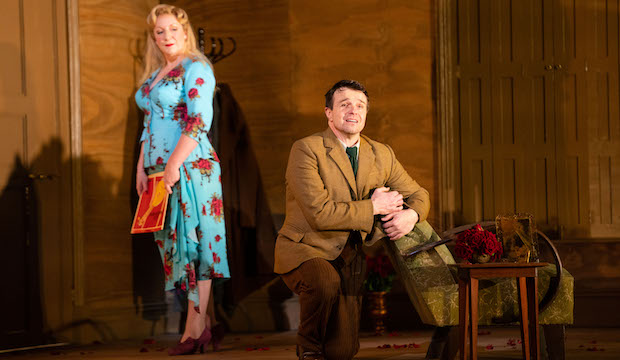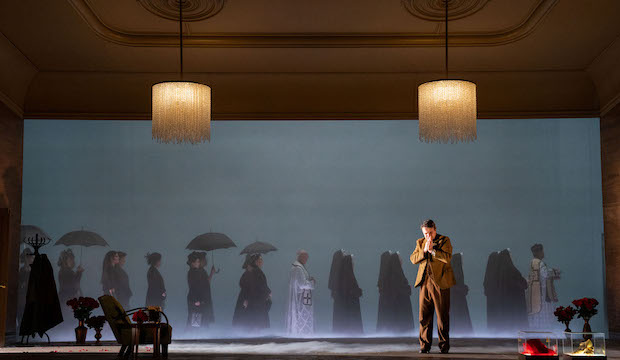The Dead City, English National Opera review ★★★★★
A rare and impressive staging of the early masterwork by a Hollywood composer
A man is haunted by memories of his wife in The Dead City. Photo: Helen Murray
‘Grief is the price we pay for love.’ That wisdom has been consoling the bereft for some 50 years. An opera that takes a little longer to reach the same conclusion was first staged just over 100 years ago. The pain of loving and losing connects all humankind, through the ages.
And this great theme is vividly acted out in Erich Korngold’s The Dead City (Die Tote Stadt in the Austrian-born composer’s original German), staged at English National Opera for the first time, and with a haunting aesthetic in this new production by ENO artistic director Annilese Miskimmon and a pedigree team.
Korngold was a child prodigy whose impressive career took a turn to the west when he escaped fascism, settling in the United States. Here he wrote for the biggest backers of the day: the film industry. His are the pulse-raising scores to tales of derring-do, little watched today but landmarks in film history.

Allison Oakes as new friend Marietta and Rolf Romeo as grieving Paul. Photo: Helen Murray
In The Dead City we get an insight into the more traditional career that he left behind, as a composer of opera and concert pieces (the Violin Concerto is one of few Korngold works regularly played). Here are vast, sprawling themes unfolding in their own time, not at the whim of a film director, with orchestral scoring on a colossal scale.
Central character Paul has lost his beautiful wife Marie, and turned his wood-lined, coffin-like home in Bruges into a shrine to her memory. Red roses are ordered in round the clock, her possessions, including her blond plait, treated as sacred objects. But when Paul spots Marie’s doppelganger in town, he invites her into his home, in an attempt to re-create Marie.
The flesh-and-blood double, Marietta, is interested in Paul, but then alarmed, when she discovers a picture of Marie. She flees, but Paul’s fantasy continues to unfold, to an unsavoury ending that proves, thank goodness, to be unreal. Reality kicks in, instead, in the realisation that he has to lead a new life, without Marie. Grief was the price he paid for love, but his debt is written off. He has a new future of his own.

Marietta (Allison Oakes) has her followers... Photo: Helen Murray
As Paul, Swiss tenor Rolf Romei, who has made something of a speciality of this demanding and unusual role since 2006, had an extra layer of suffering to endure. Nobly going on, despite days’ of illness in the run-up to opening night, he was at times broken by the music, in a way that was not inappropriate. But it must have been mighty uncomfortable for the singer. What a trouper.
In his lumpy brown tweed, Paul’s journey back to reality passes through a visible fog of despair, via surrealism. There are visual references Miriam Buether’s set to Korngold’s exact contemporary, René Magritte, then Belgium’s leading artist, and his unsettling domestic interiors. Nicky Gillibrand’s costumes dart playfully around the 20th century, Marie’s glittering gown in a glass case a constant reminder of her unrepeatable glamour. And the slow-mo religious procession has the stately silhouetting of a William Kentridge film.
Soprano Allison Oakes makes her ENO debut as Marietta, a role which requires the vocal heft of Wagner and Richard Strauss, composers who are very much in her hinterland. Her lack of resemblance to Marie raises questions about Paul’s thinking. Does he think the women look alike, to assuage his guilt at moving on? But why does Marietta think Marie looks like her? For all the many, many words of the libretto, written by Korngold and his father, and translated by Kelley Rourke, nothing is quite clear.

Paul (Rolf Romei) is drowning in grief. Photo: Helen Murray
Conducting the indefatigable ENO chorus and orchestra and children’s chorus is Kirill Karabits. He has some very sparky singers at his disposal as Marietta’s hangers-on, throwing shapes by inventive movement director Imogen Knight. Mezzo-soprano Sarah Connolly and Norwegian baritone Audun Iversen are Paul's steadying influences, his housekeeper and friend.
The opera pre-dates Korngold’s Hollywood years, but there is something filmic about this production. Staged only three times in Britain in 25 years, Die Tote Stadt marks a moment in 20th-century music history, and English National Opera do it proud.
The Dead City is sung in English with English surtitles. Further performances are on 28, 31 March; 3, 6, 8 April
And this great theme is vividly acted out in Erich Korngold’s The Dead City (Die Tote Stadt in the Austrian-born composer’s original German), staged at English National Opera for the first time, and with a haunting aesthetic in this new production by ENO artistic director Annilese Miskimmon and a pedigree team.
Korngold was a child prodigy whose impressive career took a turn to the west when he escaped fascism, settling in the United States. Here he wrote for the biggest backers of the day: the film industry. His are the pulse-raising scores to tales of derring-do, little watched today but landmarks in film history.

Allison Oakes as new friend Marietta and Rolf Romeo as grieving Paul. Photo: Helen Murray
In The Dead City we get an insight into the more traditional career that he left behind, as a composer of opera and concert pieces (the Violin Concerto is one of few Korngold works regularly played). Here are vast, sprawling themes unfolding in their own time, not at the whim of a film director, with orchestral scoring on a colossal scale.
Central character Paul has lost his beautiful wife Marie, and turned his wood-lined, coffin-like home in Bruges into a shrine to her memory. Red roses are ordered in round the clock, her possessions, including her blond plait, treated as sacred objects. But when Paul spots Marie’s doppelganger in town, he invites her into his home, in an attempt to re-create Marie.
The flesh-and-blood double, Marietta, is interested in Paul, but then alarmed, when she discovers a picture of Marie. She flees, but Paul’s fantasy continues to unfold, to an unsavoury ending that proves, thank goodness, to be unreal. Reality kicks in, instead, in the realisation that he has to lead a new life, without Marie. Grief was the price he paid for love, but his debt is written off. He has a new future of his own.

Marietta (Allison Oakes) has her followers... Photo: Helen Murray
As Paul, Swiss tenor Rolf Romei, who has made something of a speciality of this demanding and unusual role since 2006, had an extra layer of suffering to endure. Nobly going on, despite days’ of illness in the run-up to opening night, he was at times broken by the music, in a way that was not inappropriate. But it must have been mighty uncomfortable for the singer. What a trouper.
In his lumpy brown tweed, Paul’s journey back to reality passes through a visible fog of despair, via surrealism. There are visual references Miriam Buether’s set to Korngold’s exact contemporary, René Magritte, then Belgium’s leading artist, and his unsettling domestic interiors. Nicky Gillibrand’s costumes dart playfully around the 20th century, Marie’s glittering gown in a glass case a constant reminder of her unrepeatable glamour. And the slow-mo religious procession has the stately silhouetting of a William Kentridge film.
Soprano Allison Oakes makes her ENO debut as Marietta, a role which requires the vocal heft of Wagner and Richard Strauss, composers who are very much in her hinterland. Her lack of resemblance to Marie raises questions about Paul’s thinking. Does he think the women look alike, to assuage his guilt at moving on? But why does Marietta think Marie looks like her? For all the many, many words of the libretto, written by Korngold and his father, and translated by Kelley Rourke, nothing is quite clear.

Paul (Rolf Romei) is drowning in grief. Photo: Helen Murray
Conducting the indefatigable ENO chorus and orchestra and children’s chorus is Kirill Karabits. He has some very sparky singers at his disposal as Marietta’s hangers-on, throwing shapes by inventive movement director Imogen Knight. Mezzo-soprano Sarah Connolly and Norwegian baritone Audun Iversen are Paul's steadying influences, his housekeeper and friend.
The opera pre-dates Korngold’s Hollywood years, but there is something filmic about this production. Staged only three times in Britain in 25 years, Die Tote Stadt marks a moment in 20th-century music history, and English National Opera do it proud.
The Dead City is sung in English with English surtitles. Further performances are on 28, 31 March; 3, 6, 8 April
TRY CULTURE WHISPER
Receive free tickets & insider tips to unlock the best of London — direct to your inbox
| What | The Dead City, English National Opera review |
| Where | English National Opera, London Coliseum, St Martin's Lane, London, WC2N 4ES | MAP |
| Nearest tube | Embankment (underground) |
| When |
25 Mar 23 – 08 Apr 23, Six performances, five at 7:30PM, one at 3PM. Running time 3hr with one interval |
| Price | £0-£160 |
| Website | Click here for details and booking |